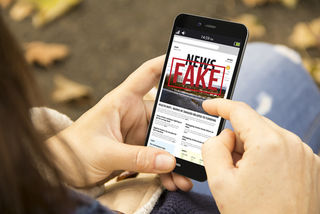Media
Why Does Fake News Spread Faster than Real News?
It’s all about pleasure.
Posted April 10, 2018
By Luba Kessler, MD

We recently learned that a company, Cambridge Analytica, harvested private information from Facebook data and used it to disseminate manufactured disinformation. Though we have been gradually accommodating the idea that our personal data is used for commercial and political purposes, the extent to which it has been turned back on us for political manipulation is both appalling and alarming. Millions of us were psychologically manipulated to influence the outcome of our presidential elections. This news is additionally concerning in light of a report from the M.I.T. Sloan School of Management that found that “fake news’ spreads significantly faster through social media than real news.
Why Does Fake News Spread So Fast?
Perhaps made up stories simply entertain us. Like gossip, they are usually titillating and sensational, and many times they feature a clear villain we can blame. Sometimes fake news is just silly and humorous. But it’s deeper than that. The stimulation of fake news fulfills a craving to relieve the burdens of our lived realities.
More than 100 years ago, the founder of psychoanalysis, Sigmund Freud, observed that powerful personal wishes and desires (the Pleasure Principle) and the rules of the world in which we live (the Reality Principle) were in constant conflict. In other words, our human wishing and wanting does not necessarily align with what reality has in store. It takes work to reconcile our wishes with our living reality. In fact, much of growing up is about negotiating between these two aspects of emotional life. As children we begin to develop a will of our own, our wants often bring on the familiar temper tantrums, but as we mature we grow out of the demanding tyranny of these wishful tempers. However, no matter how old we get, how mature, we never lose the motivating pulse of wanting and seeking pleasure. It is both the engine and the spice of human life!
Social Media and the Pleasure Principle
Our social sphere is not exempt from personal wishing, quite the contrary. In the last decade, social media has become an all-important place where we go for human connections. We bring ourselves into it. We readily and unselfconsciously divulge information about ourselves, including inadvertent expressions of what we like and what we want - in other words, our wishes.
Social media has become both a medium to showcase our lived lives and a place for pleasurable distractions from our less satisfying realities. FOMO, or “fear of missing out”, is a phrase describing the real feeling of anxiety that our social network is out having fun without us. It is not uncommon for us to look at photos of friend’s travels and adventures with envy. Perhaps we even post these photos to make our friends and family jealous?
Reality and the Cautionary Tale of Fake News
While the houses of religious worship, school, work, and local town halls remain important brick and mortar centers of community congregating and sharing of news, social media has shown to be unparalleled in its speed and penetration. And with the pleasure of fake news, combined with social network connectedness, fake news often spreads like a virus.
However, we didn’t suspect that political operatives and data companies would hijack our personal data with a subversive intent of inflaming a political culture war. Cambridge Analytica took our wishes and realities shared online and sorted it through a process of psychographic profiling. They identified what moves and motivates us and sold it to the highest bidder. This information was used to create fabricated news, tailor-made to titillate us accordingly. They deliberately served up fake news designed to hook us on conspiracy theories. In this way, our individual psychological properties jumped the turnstile into the social, and our shared reality becomes “infected”.
This fake news phenomenon then provides a cautionary tale. We have discovered that this understandable human activity of sharing our realities and desires online has become vulnerable to exploitation. Because of this, it behooves us to know more about why fake news appeals to us before we share it. We also need to expect accountability from those who are supposed to protect our data and denounce those who corrupt the media by political sabotage of our shared social space.
Finally, we should recall ourselves to our reality principle responsibilities. The internet screen in front of each of us is a shared gateway. We are not only each other’s audience, we are each other’s keepers and guardians of a shared society. Our wishes matter to us as do our morals and the realities of life.
About the Author: Luba Kessler, MD is a psychoanalyst in private practice on Long Island, New York. Her clinical work and writing are informed by interdisciplinary psychoanalytic applications ranging from neuroscientific to sociocultural.




